The one thing all these books have in common is they surprised me. They all told me stories I had never encountered before. Also the Fate of The World is (almost) never at stake. FoTW is hack. It is worse than cliché. If your book requires FoTW to make it interesting or gripping then you are doing something wrong. PS: If you want plot summaries you’ve come to the wrong place.
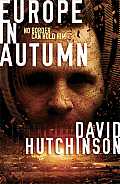 Not sure how I came across Europe in Autumn by Dave Hutchinson but I am so glad I did. It is a spy/dystopia novel set in a very near future when Europe has dissolved into many city states and even some neighborhood states. This novel has a strangeness akin to the great Slavic and Semitic writers of the fantastic (Kafka, I.B. Singer, Gogol, Bulgakov) combined with Le Carre or Allen Furst and yet it is firmly grounded in a world I understand. This is a book that I have taken to proselytizing for. It is far, far too good to get lost in the tide of speculative fiction books. A sequel, Europe at Midnight, came out earlier in November but only in the UK so far. I ordered a copy from a UK bookseller and gladly paid the shipping charges. It is every bit as good and strange as its predecessor. (Hutchinson is also great fun to follow on Twitter @HutchinsonDave: “The city of Detroit was renamed in his honour, but no one was told about it.”)
Not sure how I came across Europe in Autumn by Dave Hutchinson but I am so glad I did. It is a spy/dystopia novel set in a very near future when Europe has dissolved into many city states and even some neighborhood states. This novel has a strangeness akin to the great Slavic and Semitic writers of the fantastic (Kafka, I.B. Singer, Gogol, Bulgakov) combined with Le Carre or Allen Furst and yet it is firmly grounded in a world I understand. This is a book that I have taken to proselytizing for. It is far, far too good to get lost in the tide of speculative fiction books. A sequel, Europe at Midnight, came out earlier in November but only in the UK so far. I ordered a copy from a UK bookseller and gladly paid the shipping charges. It is every bit as good and strange as its predecessor. (Hutchinson is also great fun to follow on Twitter @HutchinsonDave: “The city of Detroit was renamed in his honour, but no one was told about it.”)
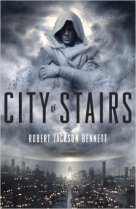 Like Europe in Autumn, Robert Jackson Bennett’s City of Stairs has a great unexplained strangeness in it. The book successfully combines noir and fantasy, something which many writers have tried to do but very, very few have succeeded. Stairs is nothing I had read before, original and surprising. Unfortunately the just-published sequel, City of Blades, isn’t nearly as good. Stairs indicates and implies things, letting the reader fill in the blanks. Blades doesn’t. Everything is explained which kills the wonderful strangeness. However, Blades seems to be the exception in Bennett’s writing. This year I also read his horror novel American Elsewhere is every bit as good as Stairs and totally different from it. I don’t read much horror but Bennet has got am looking forward to reading his first novel Mr. Shivers.
Like Europe in Autumn, Robert Jackson Bennett’s City of Stairs has a great unexplained strangeness in it. The book successfully combines noir and fantasy, something which many writers have tried to do but very, very few have succeeded. Stairs is nothing I had read before, original and surprising. Unfortunately the just-published sequel, City of Blades, isn’t nearly as good. Stairs indicates and implies things, letting the reader fill in the blanks. Blades doesn’t. Everything is explained which kills the wonderful strangeness. However, Blades seems to be the exception in Bennett’s writing. This year I also read his horror novel American Elsewhere is every bit as good as Stairs and totally different from it. I don’t read much horror but Bennet has got am looking forward to reading his first novel Mr. Shivers.
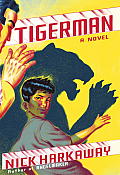 My friend David Durand tipped me to Nick Harkaway earlier this year and I quickly read all three of his published novels because he is an excellent writer. His first two, The Gone-Away World & Angelmaker, are very good. Angelmaker is a truly funny crime book. However neither prepared me for his latest novel, Tigerman, which is superb. It is set on a fictitious island nation in the Arabian Sea, a former British colony, and the time is roughly now. The setting is so vivid it reminds me of Jan Morris’ great novel, Hav, which also made real a fictitious nation. The story itself is reminiscent of Graham Greene’s novels of life in post-imperial circumstances while still being totally original. I think to say more would spoil it. I urge you to read it.
My friend David Durand tipped me to Nick Harkaway earlier this year and I quickly read all three of his published novels because he is an excellent writer. His first two, The Gone-Away World & Angelmaker, are very good. Angelmaker is a truly funny crime book. However neither prepared me for his latest novel, Tigerman, which is superb. It is set on a fictitious island nation in the Arabian Sea, a former British colony, and the time is roughly now. The setting is so vivid it reminds me of Jan Morris’ great novel, Hav, which also made real a fictitious nation. The story itself is reminiscent of Graham Greene’s novels of life in post-imperial circumstances while still being totally original. I think to say more would spoil it. I urge you to read it.
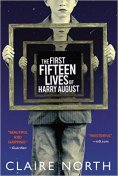 I never thought I would have any interest in a time travel book again. Then I read The First Fifteen Lives of Harry August by Claire North (a pen name of Catherine Webb). This is nothing I have read before. The plot, the ideas and the characters are all smart and unexpected. The only thing that is in any way even slightly similar is Kim Stanley Robinson’s The Years of Rice and Salt which is sui generis among his novels. Even there the similarity is more a distant echo than anything else. I will read anything Ms. North/Webb writes, up to and including a grocery list.
I never thought I would have any interest in a time travel book again. Then I read The First Fifteen Lives of Harry August by Claire North (a pen name of Catherine Webb). This is nothing I have read before. The plot, the ideas and the characters are all smart and unexpected. The only thing that is in any way even slightly similar is Kim Stanley Robinson’s The Years of Rice and Salt which is sui generis among his novels. Even there the similarity is more a distant echo than anything else. I will read anything Ms. North/Webb writes, up to and including a grocery list.
Guy Gavriel Kay is a renowned and well-known fantasy writer. Prior to this year I had tried to read some of his best known books and couldn’t get into them. Fortunately I didn’t remember that when I picked up Under Heaven and then River of Stars. These two books are fantasy retellings of events from Chinese history. They take place in an ancient-China-like land where magic exists. These books have a depth and richness I didn’t find in his other works. It may be because Kay is able to draw on the all the sources and stories about this period or it may be some other reason, I don’t know or care. I do know that these are wonder filled and wonderful books.
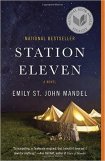 Like The First Fifteen Lives of Harry August Emily St. John Mandel’s Station Eleven does something new with a heavily used standard science fiction idea. In this case it is life in the post-apocalyptic world. She removes the exoticism which is usually the basis for these stories. This makes the world and people in it seem very normal which only heightens the impact of what they are going through. This is a book I would give to someone who says they never S****** F******. It is very literary, in the best sense of the word. (A finalist for this year’s National Book Award in fact.) It is literary enough that I expect it will somehow not get trapped by the idiotic genre designation that seems to prevent otherwise sensible people from reading certain books.
Like The First Fifteen Lives of Harry August Emily St. John Mandel’s Station Eleven does something new with a heavily used standard science fiction idea. In this case it is life in the post-apocalyptic world. She removes the exoticism which is usually the basis for these stories. This makes the world and people in it seem very normal which only heightens the impact of what they are going through. This is a book I would give to someone who says they never S****** F******. It is very literary, in the best sense of the word. (A finalist for this year’s National Book Award in fact.) It is literary enough that I expect it will somehow not get trapped by the idiotic genre designation that seems to prevent otherwise sensible people from reading certain books.
Paolo Bacigalupi is the author of The Windup Girl. If you haven’t read it then go right now and do so. Don’t worry, I’ll wait. <Jeopardy theme song as a week or so passes> See. I told you so. Anyway, this year he published The Water Knife and it, deservedly, got a lot of attention. It’s set in an America that has fractured as the water has dried up. It’s a fine book and manages to make the legal end of a dispute over water rights fascinating.
Greg Bear, War Dogs: A stranger came to visit and brought many wondrous gifts. And then the stranger left – rapidly because the bad guys (maybe?) have shown up and are approaching earth (we think).
Jeff Vandermeer, Southern Reaches trilogy: Annihilation, Authority, Acceptance. These could be classified as horror but really they are novels of weird dread. It’s very hard to overstate how good they are.
Kathleen Ann Goonan, In War Times: I’m just going to steal this: “Goonan weaves experimental jazz, particle physics, and biochemistry into a compelling adventure through alternate universes.” All that and World War II, too.
Jo Walton, Farthing (Small Change, #1) Walton, author of the great Among Others (read it before you read this. They aren’t related to each other, it’s just that Among Others is a masterpiece), takes on the What-If-The-Nazis-Had-Conquered-England story and wins. She does this by doing what great writers do: Focusing on the people, not the plot.
Ann Leckie, Ancillary Sword: Begin with Ancillary Justice, the first novel in this series which won a whole bunch of awards, then read Sword (which won a fair number as well) and then do what I’m about to do and read the third volume Ancillary Mercy. Leckie has taken a key idea from the late Iain M. Bank’s Culture series, the existence of giant minds/consciousness which run starships, and made it smaller. She makes them human and subject to the same baffling emotions the rest of us go through.
Ben H. Winters, The Last Policeman trilogy: The world is about to be destroyed by a comet and everyone already knows it. So why is this cop investigating a murder?
James S.A. Corey: Cibola Burn: This series is the best Space Opera being written today: Big, fun, action, action, action, and with enough emotional depth that you don’t have to think of it as a guilty pleasure.
Charles Stross, Rule 34: There’s something in the air or water or something in Scotland – Great SF writers seem to be everywhere: Iain Banks, Ken MacLeod and Charlie Stross to name just a few. Rule 34 is a police procedural set in a near future. The protagonist is head of the Innovative Crimes Investigation Unit, otherwise known as the Rule 34 Squad, which monitors the internet for potential criminal activity, analyzing trends in the extreme fringes of explicit content. You can also pretty much read anything by Stross and at its worst it will be interesting and smart.
Ken MacLeod, The Execution Channel: Another near future story, this one is about espionage. It’s filled with all the things you want from a good spy novel: Betrayal, emotional and political confusion and great atmosphere. The Execution Channel – where various groups broadcast the executions of captives – plays a small role in the plot but is a constant darkness throughout the book. This was written in 2007 and nails a significant part of the world in 2015. I also recommend his novel The Sky Road which is a wonderful, over-the-top, trippy, comic railroad story.
Carol Emshwiller, The Secret City: Emshwiller is a far-too-little known writer. I think this is because she mostly writes short stories which don’t get the same attention as novels and because her books have all been published by small companies. She has won about every award that can be won and should have been designated a national treasure long ago. Secret City is one of her novels. It is about “a mysterious enclave protecting a lost culture, a hidden city in the wilderness where stranded aliens struggle to preserve their fragile society. Hoping for a better life, many have fled the Secret City in favor of trying to survive in the harsh human world; others remain concealed, living out a fading memory in hope of deliverance.”
Graphic Novels:
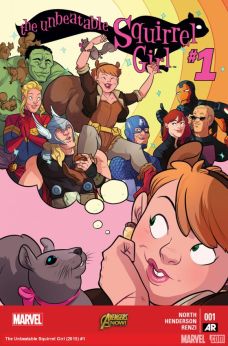 Frank M. Young, The Carter Family: Don’t Forget This Song The real lives and times of the people who along with Jimmy Rodgers invented what today we call country music. Top Notch.
Frank M. Young, The Carter Family: Don’t Forget This Song The real lives and times of the people who along with Jimmy Rodgers invented what today we call country music. Top Notch.
Unbeatable Squirrel Girl Volume 1: This is the best, smartest, funniest comic book I have read since Cerebus. SG is part of the Marvel universe and makes fun of it and every other comic book trope, idea and stereotype. She is a mutant (as in the X-Men and why is a mixed gender group called the X-Men anyway? One of SG’s great questions) with the powers of yes a squirrel. Her confrontation with Galactus, Destroyer of Worlds, had me laughing out loud even after several re-reads.
